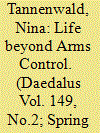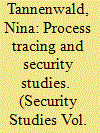| Srl | Item |
| 1 |
ID:
162691


|
|
|
|
|
| Summary/Abstract |
Since August 1945, when the United States dropped two nuclear bombs on Japan in the closing days of WWII, no nation has employed nuclear weapons during war. Many people at the time fully expected that nuclear weapons would be used again after 1945. Yet, neither Presidents Harry Truman nor Dwight Eisenhower used nuclear weapons in the Korean War; Eisenhower refused requests to use nuclear weapons to bail out the French at Dien Bien Phu in 1954; and President John F. Kennedy and Russian Premier Nikita Khrushchev engaged in secret diplomacy to avoid a nuclear catastrophe during the 1962 Cuban Missile Crisis.
|
|
|
|
|
|
|
|
|
|
|
|
|
|
|
|
| 2 |
ID:
172903


|
|
|
|
|
| Summary/Abstract |
Today, we are on the verge of a world without nuclear restraint. In the absence of formal arms control, how do we proceed? What broad principles and norms would we want? What measures might nuclear-armed states take, even without formal agreement, that would reduce the risk of nuclear war and control the arms race? I suggest that nuclear-armed states move toward a global regime of nuclear restraint and responsibility. Restraint would primarily take the form of reciprocal commitments and unilateral measures to avoid an arms race and reduce nuclear dangers. Responsibility refers to the fact that nuclear-armed states must pursue limited forms of deterrence and are accountable to the international community. I suggest several steps that governments, with the help of civil society, could take, beginning with the most minimal, declaratory initiatives and unilateral measures, and proceeding to steps that require more action.
|
|
|
|
|
|
|
|
|
|
|
|
|
|
|
|
| 3 |
ID:
187489


|
|
|
| 4 |
ID:
100918


|
|
|
|
|
| Publication |
Cambridge, Cambridge University Press, 2007.
|
| Description |
xiii, 449p.
|
| Series |
Cambridge studies in international relations
|
| Standard Number |
9780521524285
|
|
|
|
|
|
|
|
|
|
|
|
Copies: C:1/I:0,R:0,Q:0
Circulation
| Accession# | Call# | Current Location | Status | Policy | Location |
| 055560 | 355.02170973/TAN 055560 | Main | On Shelf | General | |
|
|
|
|
| 5 |
ID:
073528


|
|
|
|
|
| Publication |
2006.
|
| Summary/Abstract |
This article analyzes why US leaders did not use nuclear weapons during the Vietnam War. To date, there has been no systematic study of US decision-making on nuclear weapons during this war. This article offers an initial analysis, focusing on the Johnson and Nixon administrations. Although US leaders did not come close to using nuclear weapons in the conflict, nuclear options received more attention than has previously been appreciated. Johnson's advisers raised the issue of nuclear weapons and threats on several occasions, and Henry Kissinger, Nixon's national security adviser, looked into nuclear options to bring the war to an end. Ultimately, however, both administrations privately rejected such options. The conventional explanation for the non-use of nuclear weapons during the Cold War - deterrence - is insufficient to explain the Vietnam case. This article analyzes the role of military, political and normative considerations in restraining US use of nuclear weapons in the Vietnam War. It argues that while military and political considerations, including escalation concerns, are part of the explanation, a taboo against the use of nuclear weapons played a critical role.
|
|
|
|
|
|
|
|
|
|
|
|
|
|
|
|
| 6 |
ID:
140397


|
|
|
|
|
| Summary/Abstract |
Process tracing is used widely in security studies to advance all kinds of arguments. When, if ever, is it capable of “resolving” anything? Does the outcome of debates hinge on “good” or “bad” process tracing? In short, does process tracing lead to superior scholarly work? How would we know? This essay considers how we can judge whether some process tracing claims are more convincing than others, drawing on the competing process tracing-based claims of alternative explanations for the end of the Cold War. It argues that for process tracing to contribute to the resolution of debates, scholars will need to agree on what constitutes a key test of their explanations.
|
|
|
|
|
|
|
|
|
|
|
|
|
|
|
|
| 7 |
ID:
062498


|
|
|
| 8 |
ID:
162358


|
|
|